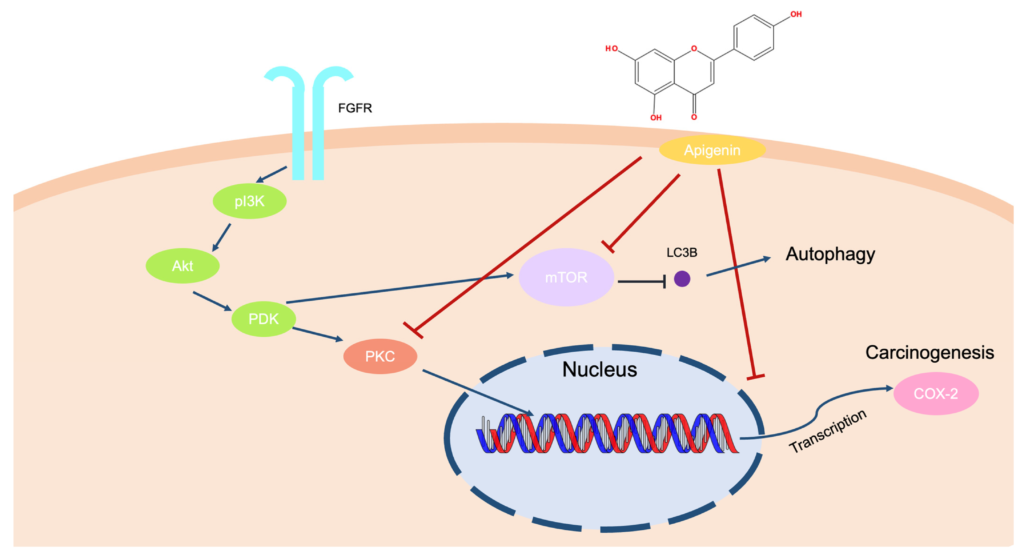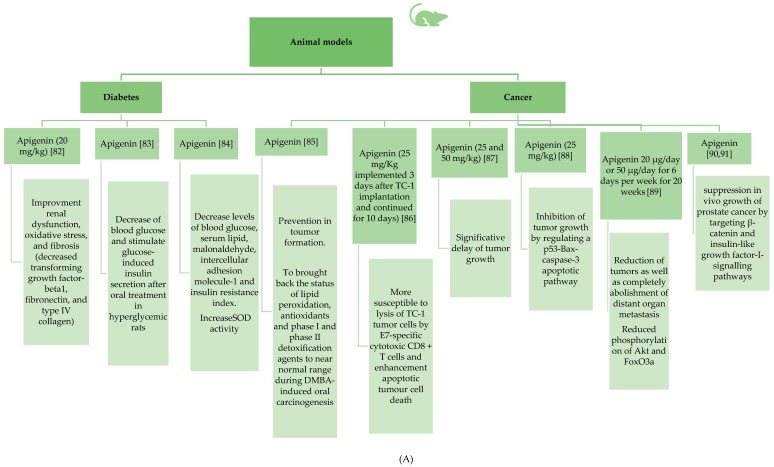Introduction to Apigenin
Apigenin is a flavonoid, a type of plant compound, found in a variety of fruits, vegetables, and herbs. It is known for its antioxidant and anti-inflammatory properties. Apigenin is often studied for its potential health benefits, including its role in reducing the risk of chronic diseases such as cancer, heart disease, and Alzheimer’s disease. It can be taken as a powder or consumed through dietary sources such as parsley, apples, celery, thyme, and grapefruit. Depending on sex, weight, and overall health, apigenin is usually supplemented at 2.5-250 milligrams. The preclinical data surrounding this supplement are promising, with many papers concluding the compound has anti-inflammatory effects and can cross the blood-brain barrier (BBB) where it can interact with the GABAa-receptor, thus acting on the central nervous system (CNS). There are several ongoing clinical trials suggesting apigenin can serve as a therapeutic in several diseases like atherosclerosis, depression, and Alzheimer’s disease.

Apigenin and Inflammation
The major benefit of apigenin is seen through its anti-inflammatory properties. Most of this evidence is from cell work (in vitro). However, this still highlights the the compound’s therapeutic potential.

Apigenin elicits its anti-inflammatory properties through several mechanisms, including inhibition of proinflammatory molecules such as cytokines (interleukin-1β, interleukin-6, tumor necrosis factor-alpha), prostaglandins, and NF-kappa b. Some studies have also shown that apigenin can act as an anti-oxidant, thus reducing the number of reactive oxygen species (ROS) in the cell.
Results of Apigenin Supplementation
There are limited human trials using apigenin, and for those that use it, it is usually in combination with other compounds. This is mostly due to the fact that apigenin is a component of chamomile tea. However, there are some studies that test apigenin in rodent models. This is not the best standard, but these models can help us elucidate the mechanisms and therapeutic benefits of this compound.

The in vivo studies utilizing apigenin have been promising thus far. It has been investigated to treat diabetes, cancer, depression, and Alzheimer’s disease, with most of these studies reporting significant improvements after apigenin treatment. When looking at the clinic, apigenin has had some great success, showing benefits for patients with a myriad of diseases.

Supplementing with Apigenin
As with any new compound, be sure to titrate up the dose while keeping detailed records of the measurements you would like to see an improvement in. Doing so will help track the benefits of apigenin supplementation and limit some of the potential side effects. Starting with 2.5 mg at night, be sure to mark “hours slept” or “anxiety/depression score” using a standardized test, depending on the results you are expecting from apigenin. This is open to the placebo effect and positive results should be taken with a grain of salt. For more accurate testing, you will need to be blinded, which can be done with your spouse. An example of this would look like having a friend give you a blank or apigenin capsule and then taking the measurements. Other ways to ensure this compound is beneficial is by looking at your blood work, specifically epinephrine, norepinephrine and inflammatory molecule levels.
Final Thoughts
Although there are lots of studies supporting the use of apigenin, I do not believe in a “one molecule fixes all” approach. Rather, this may work for some of you experiencing a small niche of anxiety, depression, or insomnia. Furthermore, do not expect major lifechanging results from a molecule such as apigenin. If it were life-changing, the market and the national institute of health (NIH) would have it documented thoroughly.